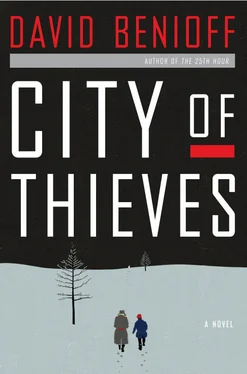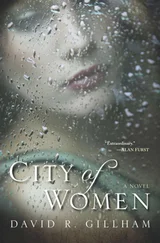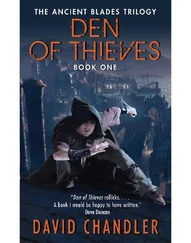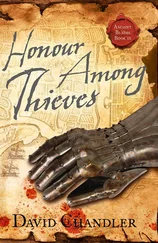“You said the bad news is we’re going the wrong way.”
“There isn’t any good news. Just because there’s bad news doesn’t mean there’s good news, too.”
There was nothing left to say so I started walking to the farmhouse. The moon rose above the treetops, the ice-skinned snow snapped beneath my boots, and if a German sniper was targeting my head, I wished him good aim. I was hungry, but I knew how to deal with my hunger; we were all experts now at dealing with hunger. The cold was brutal, but I was used to the cold, too. But my legs were quitting on me. Before the war they were weak, poorly suited for running and jumping and whatever else legs are meant for. The siege had whittled them down to broomsticks. Even if we had been on the right path to Mga, I never could have made it. I couldn’t have walked another five minutes.
Halfway to the farmhouse Kolya caught up with me. He had pulled out the Tokarev pistol and held it in his gloved hand.
“If we’re going to do this,” he said, “we don’t have to be stupid about it.”
He led me behind the house and made me wait on the back porch under the eave, where the firewood was stacked safe and dry. A three-kilo tin of Beluga caviar would not have seemed more luxurious at that moment than the neatly stacked firewood, rising in crisscross formations higher than my head.
Kolya crept over to a frosted window and peeked inside, the sleek black fur of his Astrakhan cap shimmering in the firelight. Inside the house music played on a phonograph—jazz piano, something American.
“Who’s in there?” I whispered. He held up his palm to silence me. He seemed transfixed by whatever he saw, and I wondered if we had stumbled across more cannibals out in the snowy depths of the country or, more likely, the mutilated remains of the family who once lived here.
But Kolya had dealt with cannibals before and he had seen plenty of corpses. This was something new, something unexpected, and after another thirty seconds I disobeyed his order and joined him at the window, careful not to brush off any of the icicles hanging from the lintel. I crouched beside him and peered over the bottom edge of the glass.
Two girls in nightshirts danced to the jazz recording. They were lovely and young, no older than me, the blonde leading the brunet. She was very pale, her throat and cheeks washed with freckles, her eyebrows and eyelashes so light they disappeared when seen edgewise. The dark-haired girl was smaller, clumsy, unable to find the rhythm in the syncopation. Her teeth were too big for her mouth and her arms were chubby, creased at the wrists like a baby’s. You wouldn’t have noticed her in peacetime, strolling down the Nevsky, but there was something wildly exotic now about a plump girl. Somebody with power loved her and kept her fed.
I was so dazzled by the sight of the dancing girls that I didn’t realize for a moment they were not alone. Two more girls lay on their bellies on a black bearskin rug in front of the fireplace. Both had their chins propped on their hands, their elbows on the rug, watching the dance with serious expressions on their faces. One looked Chechen, her black eyebrows nearly meeting above her nose, her lips painted bright red, her hair piled up in a wet towel above her head, as if she had just bathed. The other girl had the long, elegant neck of a ballerina, her nose a perfect right angle in profile, her brown hair tied back in tight pigtails.
The interior of the farmhouse looked more like a hunting lodge. The heads of dead animals festooned the walls of the great room: brown bear, wild boar, an ibex with massive curling horns and a scruffy chin beard. A stuffed wolf and lynx flanked the fireplace, posed in mid prowl, their mouths open and fangs glistening white. Candles burned in wall sconces.
Kolya and I crouched outside the window and stared at the scene until the song ended and the Chechen-looking girl got up to change the record.
“Play that one again,” said the blonde. Her voice was muffled by the glass, but it was still easy to hear her.
“Not again! Please,” said her partner, “something I know. Put on the Eddie Rozner.”
I turned to look at Kolya. I expected him to be grinning, ecstatic about this surreal vision we’d stumbled across in the middle of the snowy wasteland. But he looked grim, his lips pressed together, something angry in his eyes.
“Come on,” he said, standing and leading me back around to the front of the house. A new record had started playing, more jazz, a trumpeter leading his band in a merry charge.
“We’re going in? I think they had food in there. I thought I saw some—”
“I’m sure they have plenty of food.”
He knocked on the front door of the farmhouse. The music stopped playing. A few seconds later the blond girl appeared behind the mullioned window next to the doorway. She stared at us for a long time without saying anything or making any move toward the door.
“We’re Russian,” said Kolya. “Open the door.”
She shook her head. “You shouldn’t be here.”
“I know,” he said, holding up the pistol so the girl could see it. “But we are, so open the door, goddamn your mother.”
The blonde looked back toward the great room. She whispered something to someone standing out of sight and listened to the response. Nodding, she turned to look at us again, took a deep breath, and opened the door.
Stepping inside the farmhouse felt like entering the belly of the whale, the warmest place I’d been in months. We followed the blonde into the great room, where her three friends stood in an uneasy line, fingers fidgeting with the hems of their nightshirts. The little brunet with the chubby arms looked ready to cry; her lower lip quivered as she stared at Kolya’s pistol.
“Is anyone else here?” he asked.
The blonde shook her head.
“When are they coming?” he asked.
The girls exchanged glances.
“Who?” asked the one who looked Chechen.
“Don’t play with me, ladies. I’m an officer in the Red Army, I’m on special orders—”
“Is he an officer, too?” asked the blonde, looking at me. She wasn’t smiling, quite, but I could see the amusement in her eyes.
“No, he’s not an officer, he’s an enlisted man—”
“An enlisted man? Really? How old are you, sweetness?”
All the girls were looking at me now. In the warmth of the room, under the weight of their stares, I could feel the blood rushing to my face.
“Nineteen,” I said, standing very straight. “Twenty in April.”
“Tssk, you’re little for nineteen,” said the Chechen girl.
“Fifteen at best,” said the blonde.
Kolya racked the pistol’s slide, chambering a bullet—a dramatic sound in the quiet room. The gesture seemed overly theatrical to me, but Kolya had a way of pulling off theatrical gestures. He kept the pistol pointed at the floor and looked into each girl’s face, taking his time with each one.
“We’ve come a long way,” he said. “My friend here is tired. I’m tired. So I’ll ask you again, one last time, when are they coming?”
“They usually come around midnight,” said the chubby brunet. The other girls watched her closely but said nothing. “After they’re finished with the shelling.”
“Is that right? So after the Germans get bored firing their artillery at all of us in Piter, they come here for the night and you take care of them?”
In certain ways I am deeply stupid. I don’t say this out of modesty. I believe that I’m more intelligent than the average human being, though perhaps intelligence should not be looked at as a single gauge, like a speedometer, but as a full array of tachometers, odometers, altimeters, and the rest. My father taught me how to read when I was four, which he always bragged about to his friends, but my inability to learn French or remember the dates of Suvorov’s victories must have troubled him. He was a true polymath, able to recite any stanza of Eugene Onegin at command, fluent in French and English, good enough at theoretical physics that his professors at the university considered his abdication to poetry a minor tragedy. I wish they had been more charismatic, his professors. I wish they had taught him the consolation of physics, explained to their star student why the shape of the universe and the weight of light were more important than unrhymed verses on the swindlers and abortionists of Leningrad.
Читать дальше












